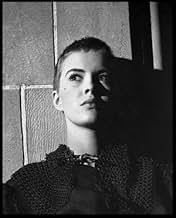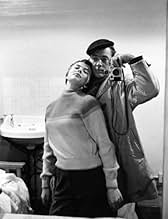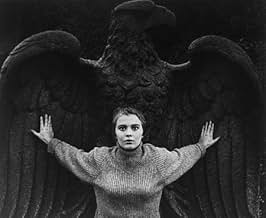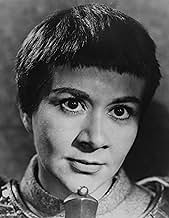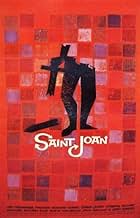1456 erinnert sich der französische König Karl VII. daran, wie er dem 17-jährigen Bauernmädchen Jeanne d'Arc begegnete, ihr das Kommando über die französische Armee übertrug und sie schließl... Alles lesen1456 erinnert sich der französische König Karl VII. daran, wie er dem 17-jährigen Bauernmädchen Jeanne d'Arc begegnete, ihr das Kommando über die französische Armee übertrug und sie schließlich als Ketzerin auf dem Scheiterhaufen verbrennen ließ.1456 erinnert sich der französische König Karl VII. daran, wie er dem 17-jährigen Bauernmädchen Jeanne d'Arc begegnete, ihr das Kommando über die französische Armee übertrug und sie schließlich als Ketzerin auf dem Scheiterhaufen verbrennen ließ.
- Regie
- Drehbuch
- Hauptbesetzung
- La Tremouille
- (as Francis de Wolff)
Empfohlene Bewertungen
What was not originally appreciated about this film is that the story of Joan of Arc is an exceptionally simple one, but yet cloaked in mystery. Where the film failed was perhaps in not making us empathise with Joan, because we are given nothing of her motivations or her life before or after the seige at Orleans. Compare this to the Besson film, that fails in my eyes for the exact opposite reason, it gives us too much! I liked the film, but I liked it because although I couldn't empathise with a saint, I could empathise with a young woman who knew what she was doing, but didn't know where she was going. What I shall always remember about this film is Seberg's transformation from trusting, coy and innocent to bewildered, bothered and (dare I say it) bewitched. A great performance, and she really ought to have gone on to greater things.
Shaw wanted to present his Joan differently and this movie is about Shaw's Joan. Preminger and Greene present a noble effort of Shaw's play. It is entertaining in that it tells a good story without over romanticizing Joan nor over vilifying her chief executioner, Cauchon (Anton Walbrook). Dunois, Bastard of Orleans (Richard Todd) supports Joan's efforts and serves as her fellow soldier-in-arms. Richard Widmark--as the Dauphin that Joan makes Charles VII--plays his role as a childish clown. Finally, (Sir) John Gielgud admirably presents the English side of this story as he portrays Warwick. This movie is quite worth while--especially for Shaw fans.
As played by Jean Seberg(whose subsequent life offers a eerie parallel to her role here), she is presented as an innocent, a figure of purity whose very actions and presence reveals the corruption and emptiness in everyone. As such Seberg plays her as both Saint and Madwoman. Her own lack of experience as an actress when she made this film(which does show up in spots) conveys the freshness and youth of Jeanne revealing both the fact that Jeanne la Pucelle is a humble illiterate peasant girl who strode out to protect her village and her natural intelligence. By no means did she deserve the harsh criticism that she got on the film's first release, it's a performance far beyond the ken and call of any first-time actress with no prior acting experience. Shaw and Preminger took a secular view towards Joan seeing her as a medieval era feminist, not content with being a rustic daughter who's fate is to be married away or a whore picked up by soldiers to and away from battlefields. Her faith, her voices, her visions which she intermingles with words such as "imagination" and "common sense" leads her to wear the armour of her fellow soldiers to lead them to battle to chase the invading Englishman out of France.
And yet it can be said that the film is more interested in the court of the Dauphin(Richard Widmark), the office of the clergy who try Joan led by Pierre Cauchon(Anton Walbrook, impeccably cast) and the actions of the Earl of Warwick(John Gielgud) then in Joan herself. The superb ensemble cast(all male) portray figures of scheming, Machievellian(although the story precedes Niccolo) opportunists who treat religion as a childish toy to be used and manipulated for their own ends. The sharp sardonic dialogue gives the actors great fun to let loose. John Gielgud as the eminently rational Earl whose intelligence,(albeit accompanied by corruption), allows him to calculate the precise manner in which he can ensure Joan gets burnt at the stake and Anton Walbrook's Pierre Cauchon brings a three dimensional portrait to this intelligent theologian who will give Joan the fair trial that will certainly find her guilty. Richard Widmark as the Dauphin is a real revelation. As against-type a casting choice you'll ever find, Widmark portrays the weak future ruler of France in a frenzied, comic caricature that's as close as this film comes to comic relief. A comic performance that feels like an imitation of Jerry Lewis far more than an impetuous future ruler of France.
Preminger shot ''Saint Joan'' in black and white, the cinematographer is Georges Perinal who worked with Rene Clair and who did ''The Life and Death of Colonel Blimp'' in colour. It's perfectly restrained to emphasize the rational intellectual atmosphere for this film. Preminger's preference for tracking shots of long uninterrupted takes is key to the effectiveness of the film, there's no sense of a wasted movement anywhere in his mise-en-scene.
It also marks the direction of Preminger's most mature(and most neglected period) his focus is on the conflict between individuals and the institutions in which they work, how the institution function and how the individual acts as per his principles. These themes get their most direct treatment in his film and as always he keeps things unpredictable and finds no black and white answers. This is one of his very best and most effective films.
I'm not really sure that any other culture than the French ought to be telling her story, inevitably the interpretation will fall short of the mark. It falls short here because we have two diametrically opposed viewpoints working on the treatment.
The key to this film is that it is adapted from a play by George Bernard Shaw by Graham Greene. So we have the writing of a Fabian Socialist being interpreted by one very Catholic writer. I think there's a great deal more Greene than Shaw.
Shaw gets his innings here, but I think Graham Greene dominates the film. If he had lived I'm sure Shaw would not have approved.
Charles VIII in history or as portrayed by Richard Widmark here or Jose Ferrer in the Ingrid Bergman film about Joan of Arc, is not the noblest of monarchs. If you are a good Catholic, what he did was going against the will of the Deity. Otherwise though what he tries to do in consolidating his gains makes perfect good sense.
It's funny that I did a review of Olivier's Henry V which viewed from the English point of view which shows how the French got in the situation they were in. What happens afterwards is that Henry V dies quite suddenly like Alexander the Great and England with an infant monarch and fifty year plus struggle for power implodes internally.
Before he died however Charles VII disowned his son the Dauphin and blessed the marriage of Henry V to his daughter Katherine with the provision that Henry succeed Charles VII as King. The French for good reason do not list the English Henry as one of their kings.
Enter Joan of Arc whose visions inspire an army and a nation. As played by Jean Seberg she's in the right age group to be sure. But I think Ingrid Bergman being the far more skilled professional carries it off better in her film. Ditto for Jose Ferrer instead of Richard Widmark. The best acted parts in this film are Anton Walbrook as Cauchon the Bishop who presided over the trial and the clever and serpentine John Gielgud as the Earl of Warwick.
Maybe if Otto Preminger had chosen to film pure Shaw, Saint Joan would have been better received.
Wusstest du schon
- WissenswertesAudrey Hepburn was originally offered the role of Joan. It was rumored that she turned it down because her husband, Mel Ferrer, wasn't approached for the part of the Dauphin, but Ferrer denied this.
- PatzerWhen Joan and the King stand by the river rallying the troops, the infantry men come running down the hill to join them. One of them falls on his face.
- Zitate
Inquisitor: [after condemning Joan to death by fire] It's a terrible thing to see a young and innocent creature crushed between the Church and the Law.
Cauchon: You call her innocent?
Inquisitor: Quite innocent, she didn't understand a word we were saying.
- Alternative VersionenAlso available in computer colorized version (Hal Roach VHS)
- VerbindungenFeatured in Zeit der Vergeltung (1985)
Top-Auswahl
- How long is Saint Joan?Powered by Alexa
Details
- Erscheinungsdatum
- Herkunftsländer
- Sprachen
- Auch bekannt als
- Saint Joan
- Drehorte
- Produktionsfirma
- Weitere beteiligte Unternehmen bei IMDbPro anzeigen
Box Office
- Weltweiter Bruttoertrag
- 400.000 $
- Laufzeit1 Stunde 50 Minuten
- Farbe
- Sound-Mix
- Seitenverhältnis
- 1.85 : 1

